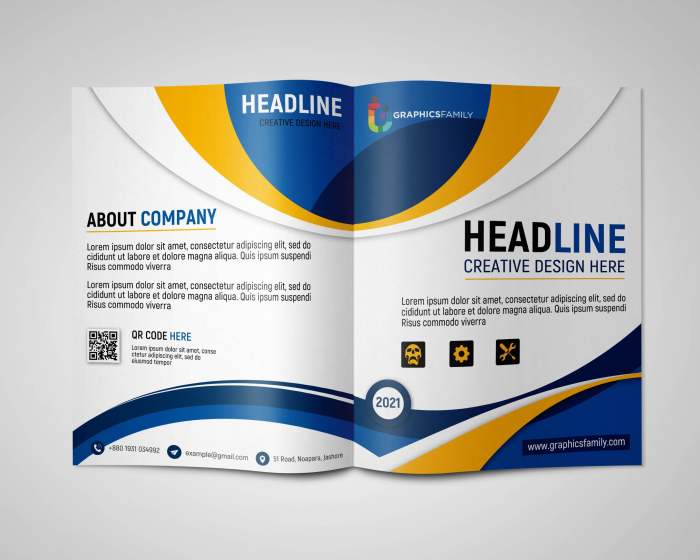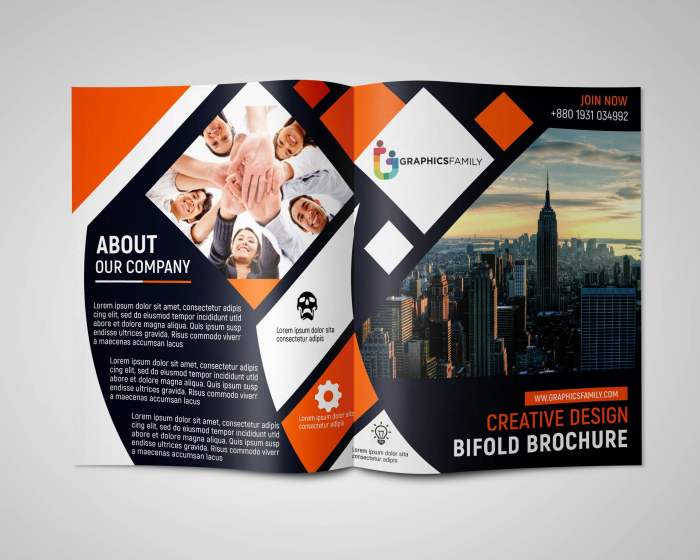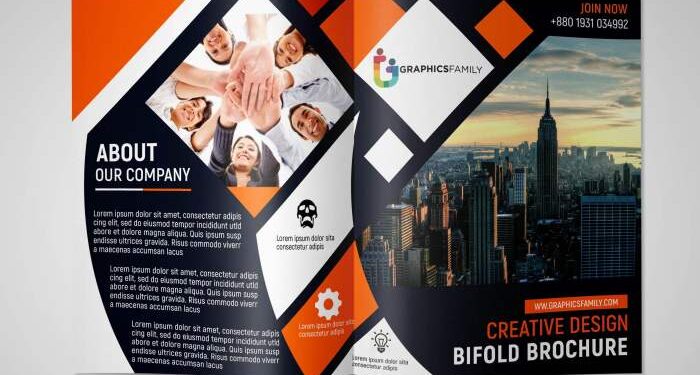Dive into the world of brochure design where creativity meets marketing strategy. This guide will walk you through the essentials of creating impactful brochures that leave a lasting impression on your audience.
From understanding the importance of design elements to exploring the latest trends, this introduction sets the stage for an insightful journey into the art of brochure design.
Importance of Brochure Design

Brochures play a crucial role in marketing strategies as they serve as a tangible representation of a company’s products or services. A well-designed brochure not only attracts potential customers but also conveys important information in a visually appealing manner.
Impact on Brand Perception
Brochure design directly impacts brand perception by influencing how a company is perceived by its target audience. A professionally designed brochure with cohesive branding elements can enhance brand image and credibility, ultimately leading to increased trust and customer loyalty.
- Consistent Use of Branding Elements: Incorporating company logos, colors, and fonts in the brochure design helps reinforce brand identity and makes the brand more recognizable.
- Visual Appeal: Eye-catching graphics, high-quality images, and engaging layouts can captivate the audience’s attention and leave a lasting impression.
- Information Delivery: Clear and concise messaging combined with attractive design elements can effectively communicate the brand’s values, offerings, and unique selling points.
Examples of Successful Brochure Designs
Several businesses have benefited from well-executed brochure designs that have positively impacted their marketing efforts and overall business outcomes.
One notable example is the Apple product brochures, which are known for their minimalist design, sleek visuals, and informative content. These brochures have contributed to Apple’s reputation for innovation and premium quality products.
Another successful brochure design is the Nike marketing collateral, which features dynamic layouts, vibrant colors, and compelling imagery. These brochures effectively showcase Nike’s athletic apparel and footwear, reinforcing the brand’s position as a leader in the sports industry.
Elements of Effective Brochure Design
Brochures are essential marketing tools that provide valuable information about a company, product, or service. To create an effective brochure design, several key elements need to be considered to ensure it captures the attention of the target audience and conveys the intended message clearly.
Visual Hierarchy
Visual hierarchy plays a crucial role in guiding the reader’s eye through the brochure layout. By strategically placing important information such as headlines, subheadings, and key points in a prominent position, designers can ensure that the most critical details are noticed first.
This helps in creating a flow of information that is easy to follow and understand.
Color, Typography, and Imagery
Color, typography, and imagery are powerful tools that can enhance the overall look and feel of a brochure design. The use of color can evoke emotions and create a sense of brand identity, while typography choices can convey the tone and personality of the content.
High-quality images and graphics can also help in capturing the reader’s attention and making the brochure visually appealing.Incorporating these elements thoughtfully and cohesively can result in a compelling brochure design that effectively communicates the intended message and leaves a lasting impression on the audience.
Types of Brochures
When it comes to brochure design, there are several types to choose from based on the layout and folding style. Each type offers a unique way to present information and engage the audience. Let’s explore some common types of brochures and the industries that benefit from them.
Bi-Fold Brochure
A bi-fold brochure is folded in half, creating four panelstwo on the front and two on the back. This type of brochure is ideal for businesses looking to provide a simple and streamlined overview of their products or services. Industries such as real estate, beauty salons, and event planning can benefit from bi-fold brochures due to their clean and organized layout.
Tri-Fold Brochure
A tri-fold brochure is divided into three sections, with both sides folding inward to create a compact design. This type of brochure is versatile and commonly used by businesses in the tourism, healthcare, and education sectors. The multiple panels allow for easy categorization of information, making it easier for readers to navigate through the content.
Gatefold Brochure
Gatefold brochures feature two or more symmetrical folds that open like a gate to reveal the content inside. This type of brochure is often used by luxury brands, real estate developers, and high-end fashion retailers to create a sense of exclusivity and sophistication.
The unique folding style of gatefold brochures makes them stand out and leave a lasting impression on the audience.
Z-Fold Brochure
A z-fold brochure is folded into a Z shape, with the panels folding in on each other. This type of brochure is great for showcasing a step-by-step process, product features, or event schedules. Industries such as technology companies, fitness centers, and educational institutions can effectively use z-fold brochures to present information in a sequential and engaging manner.Each type of brochure offers its own advantages and is suitable for different purposes.
When choosing the right type of brochure for a specific purpose, it’s important to consider the amount of content you have, the design aesthetic you want to achieve, and the overall message you want to convey. By selecting the appropriate type of brochure, you can effectively communicate with your target audience and achieve your marketing goals.
Design Tools and Software for Brochures
When it comes to creating professional brochures, having the right design tools and software can make a significant difference in the final outcome. These tools not only help streamline the design process but also enable designers to unleash their creativity effectively.
Popular Design Tools and Software
- Adobe InDesign: Widely used by professionals, InDesign offers a wide range of features specifically tailored for creating brochures. Its layout and typography tools are top-notch.
- Canva: A user-friendly online platform that provides templates, graphics, and drag-and-drop functionality, making it easy for beginners to design stunning brochures.
- Adobe Illustrator: Ideal for creating custom illustrations and graphics for brochures, Illustrator is known for its vector-based design capabilities.
- Microsoft Publisher: A more accessible option for beginners, Publisher offers basic design tools and templates for creating simple brochures.
Tips for Leveraging Design Software Effectively
- Master the basics: Take the time to learn the ins and outs of the design software you choose to use. Understanding the tools and features will help you work more efficiently.
- Utilize templates: Design software often comes with pre-designed templates that can serve as a great starting point for your brochure. Customize them to suit your branding and content.
- Stay organized: Create layers, use grids, and label elements properly within the software to maintain a structured design process. This will save you time and effort in the long run.
- Experiment and iterate: Don’t be afraid to try out different design options and make revisions as needed. Design software allows for easy editing, so take advantage of this flexibility.
Brochure Printing and Finishing

Brochure printing and finishing are crucial steps in bringing your design to life and creating a tangible marketing tool. Choosing the right printing techniques, paper stock, and finishes can greatly impact the overall look and feel of your brochure.
Printing Techniques
- Offset Printing: Ideal for high-quality, large quantity prints, offset printing uses plates to transfer ink onto paper. It offers precise color reproduction and works well for brochures with intricate designs.
- Digital Printing: Perfect for short print runs, digital printing is cost-effective and allows for quick turnaround times. While it may not offer the same color accuracy as offset printing, it is suitable for smaller projects.
- Web-to-Print: An online printing service that allows you to upload your design and have brochures printed and delivered directly to you. It offers convenience and can be a good option for small businesses or individuals.
Paper Stock and Finishes
Choosing the right paper stock and finishes can enhance the look and feel of your brochure. Consider factors such as weight, texture, and coating to achieve the desired effect. Some common finishes include:
- Glossy: Provides a shiny finish that makes colors pop and adds a professional look.
- Matte: Offers a subtle, non-reflective finish that exudes sophistication.
- Uncoated: Gives a natural, textured feel perfect for a more organic look and feel.
Quality Control
To ensure the quality of your printed brochures, it’s essential to implement quality control measures during the printing and finishing process. This can include:
- Proofreading: Check for any errors in the design, text, or images before finalizing the print.
- Color Calibration: Ensure color accuracy by calibrating your monitor and printer to match the intended colors.
- Inspect Finishes: Verify that the finishes applied match your expectations and enhance the overall appearance of the brochure.
Brochure Design Trends
Brochure design trends are constantly evolving to keep up with the changing preferences of consumers and advancements in technology. Designers are experimenting with various styles and techniques to create innovative and eye-catching brochures that stand out from the competition.
Minimalist Design
Minimalist design has become a popular trend in brochure design, focusing on simplicity, clean lines, and a limited color palette. This style emphasizes the use of negative space to highlight key information and create a modern and sophisticated look.
Interactive Designs
With the rise of digital advancements, interactive brochure designs have become increasingly popular. These designs incorporate elements such as QR codes, augmented reality, and multimedia content to engage the audience and provide a unique and interactive experience.
Incorporating Retro Elements
Another emerging trend in brochure design is the incorporation of retro elements, such as vintage typography, old-school illustrations, and nostalgic color schemes. By blending modern design techniques with vintage aesthetics, designers can create a sense of nostalgia and evoke emotions in the audience.
Examples of Innovative Designs
- A brochure for a tech company that utilizes augmented reality to showcase their products in a 3D interactive format.
- A minimalist travel brochure that uses striking photography and limited text to convey a sense of wanderlust and adventure.
- A retro-inspired brochure for a boutique clothing store that features vintage illustrations and typography to create a unique and memorable brand identity.
Last Word
As we wrap up this exploration of brochure design, remember that a well-crafted brochure can be a game-changer for your business. Let your creativity soar and watch your brand stand out in a sea of competition with compelling brochure designs.
FAQ Compilation
What impact does brochure design have on brand perception?
Brochure design plays a crucial role in shaping how customers perceive a brand. A well-designed brochure can convey professionalism and credibility, leaving a positive impression on the audience.
How do I choose the right type of brochure for my business?
Consider your content, target audience, and budget when selecting a brochure type. For instance, a tri-fold brochure works well for presenting information in a structured manner, while a gatefold brochure adds a touch of elegance for high-end products or services.
What are some popular design tools for creating professional brochures?
Software like Adobe InDesign, Canva, and Lucidpress are commonly used for designing brochures. These tools offer a range of features to help you create visually appealing and engaging designs.
How can I ensure quality control during the printing process?
Work closely with your printing provider to review proofs and ensure color accuracy. Conducting a test print before finalizing the order can help identify any issues and guarantee the desired quality for your brochures.
What are some current trends in brochure design?
Minimalist designs, interactive elements, and unique folds are some of the trends shaping brochure design today. Embracing these trends can help your brochure stand out and engage the audience effectively.














